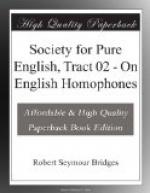The examples above are all Latin words, and since Latin words came into English through different channels, these particular vowels can have different histories.]
Once become sensible of such beauty, and of the force of sounds, a writer will find himself in trouble with no and know. These omnipresent words are each of them essentially weakened by the existence of the other, while their proximity in a sentence is now damaging. It is a misfortune that our Southern dialect should have parted entirely with all the original differentiation between them; for after the distinctive k of the verb was dropped, the negative still preserved (as it in some dialects still preserves) its broad open vowel, more like law than toe or beau, and unless that be restored I should judge that the verb to know is doomed. The third person singular of its present tense is nose, and its past tense is new, and the whole inconvenience is too radical and perpetual to be received all over the world. We have an occasional escape by using nay for no, since its homophone neigh is an unlikely neighbour; but that can serve only in one limited use of the word, and is no solution.
[Sidenote: Punnage.]
In talking with friends the common plea that I have heard for homophones is their usefulness to the punster. ’Why! would you have no puns?’ I will not answer that question; but there is no fear of our being insufficiently catered for; whatever accidental benefit be derivable from homophones, we shall always command it fully and in excess; look again at the portentous list of them! And since the essential jocularity of a pun (at least when it makes me laugh) lies in a humorous incongruity, its farcical gaiety may be heightened by a queer pronunciation. I cannot pretend to judge a sophisticated taste; but, to give an example, if, as I should urge, the o of the word petrol should be preserved, as it is now universally spoken, not having yet degraded into petr’l, a future squire will not be disqualified from airing his wit to his visitors by saying, as he points to his old stables, ‘that is where I store my petrel’, and when the joke had been illustrated in Punch, its folly would sufficiently distract the patients in a dentist’s waiting-room for years to come, in spite of gentlemen and chauffeurs continuing to say petrol, as they do now; nor would the two petr’ls be more dissimilar than the two mys.
[Sidenote: Play on words.]
Puns must of course be distinguished from such a play on words as John of Gaunt makes with his own name in Shakespeare’s King Richard II.
K. What comfort man? How is’t with aged Gaunt?
G. O, how that name befits my composition!
Old Gaunt indeed,
and gaunt in being old, &c.
where, as he explains,




